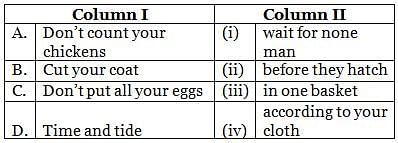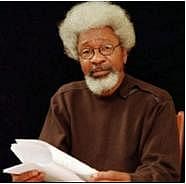Olympiad Test Level 2: Language and Literature- 1 - Class 6 MCQ
10 Questions MCQ Test GK Olympiad for Class 6 - Olympiad Test Level 2: Language and Literature- 1
Complete the proverb (Column I) by matching the letter half from (Column II).


It is used to compare two different kinds but have atleast one-point in common. Which is this literary term?
| 1 Crore+ students have signed up on EduRev. Have you? Download the App |
Which was Mark Tully’s first book in India?
This Indo-Canadian novelist has written only three novels till date and has been shortlisted for Booker Prize for all three of them. Who is this author?
He was the first Black African writer to win the Nobel Prize for Literature. Born in Nigeria, his writings focussed on Nigerian culture, dance, poetry, freedom and protest. Identify him.

Read the given lines of a famous poet and identify him/her.
If you can keep your head
when all about you
Are losing theirs and
blaming it on you.
If you can trust yourself
when all men doubt you.
But make allowance
for their doubting too;
These inspirational lines come from the poem of a very famous poet and writer. Name him/her.
In 2001 this writer was awarded the Nobel Prize for Literature. He/she is also a recipient of prestigious Man Booker Prize. His/her famous works are ‘A House for Mr. Biswas’, ‘In a Free State’ and ‘The Mimic Men’. Identify him/her.
Directions: Read the passage and answer the questions.
One of the remarkable achievements of the Neolithic Period was the invention of wheel. It brought a rapid progress in man’s life. The wheel was used in horse-carts and bullock-carts that helped man a lot to carry heavy loads. Therefore, in this period transport became quite easy and quick.
The wheel was also used for spinning and weaving. It also helped in pottery. Man made beautiful pots to keep food grains and storing water.
The tools and weapons of the Neolithic age were better and sharper than the Palaeolithic Age. Now a polished stone called celt was used to make tools. Some new developed tools like sickles, bows and arrows and improved axesx were made in the Neolithic Age. These tools were used for various purposes like, the axe was used for cutting down trees, sickles to harvest the crops and arrows to kill animals.
How was the invention of wheel useful in storing food grains and water?
George Bernard Shaw, the great dramatist, was (2016)
Who has written the famous book ‘Mankind and Mother Earth’?
|
27 docs|62 tests
|

















